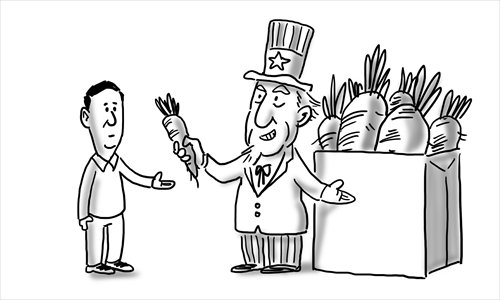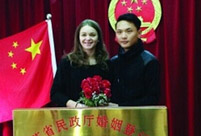


Illustration: Liu Rui/GT
The US Department of the Treasury announced last week to relax economic sanctions on Myanmar. The relaxation is said to reward Myanmar's historic progress in political reform. It also aims to boost US-Myanmese bilateral trade and improve Myanmar's economy. The partial lift of sanctions shows Washington's support for Myanmar's first elected government in more than 50 years, which marks a positive shift of Washington's Myanmar policy.
The US government has removed quite a few restrictions on Myanmar's state-owned mining and timber companies, financial organizations, foreign investment and transportation. As of today, total US investment in Myanmar only amounts to $248 million, accounting for less than 1 percent of all direct foreign investment of Myanmar.
The partial lift indicates the determination of the US to enter one of the few untapped markets in Asia. Big US brands such as General Electric, Western Union and Coca Cola have started doing business in Myanmar, and the partial lift will break the shackles on financial activities, giving further convenience to US companies in Myanmar.
However, Washington is cautious about fully releasing the Myanmese economy from its constraints. When the economic sanctions were partially lifted, six Myanmese individual companies that are reportedly connected with the junta were put on sanctions list by the US. The import blocks of Myanmese jade and rubies still remain. In mid-May, US President Barack Obama decided to extend the National Emergencies Act for another year. The act forbids US companies and individuals to have business connections with certain Myanmese individuals.
The US seems a bit ambivalent about the sanctions on Myanmar. By removing the long-standing restrictions, the US wants to boost trade and investment with Myanmar and help the ruling National League for Democracy (NLD) to improve economy. But the US still wants to use sanctions to put pressure on the military, which remains influential in Myanmar's economy and politics.
On Sunday, US Secretary of State John Kerry paid a visit to Myanmar. This is one of Kerry's many visits to Myanmar, but his first after the NLD took power. He also became the highest ranking US government official that visited Myanmar after the regime change. Kerry has conveyed to the Myanmese side the details of the partial lift of the sanctions, and released signals that the US will continue supporting Myanmar's process of democracy and economic reform.
Since Obama launched the rebalance to the Asia-Pacific strategy, Myanmar has been included as an important link to Washington's entire chain of strategic arrangements. Obama's state visit to Myanmar, the rapprochement of US-Myanmese relationship and the partial lift of economic sanctions are all meant to reinforce the link. Although the US regards Myanmar as a paragon of democratic transition, it does not feel assured about the capabilities of the new government.
Myanmar is still under international sanctions, and the NLD government hopes these sanctions can be lifted as soon as possible. But the US stresses that if Myanmar wants to remove the current restrictions and regain favorable treatments from the US in business, it has to accelerate its national reform, especially on human rights. Washington wants to guide Myanmar's reform and shape the country as it desires.
After the NLD government came into power, Aung San Suu Kyi, the NLD leader and Myanmar's foreign minister, said Myanmar will stick to a foreign policy characterized by independence, nonalignment and peaceful coexistence. The focus of Myanmar's foreign policy will be shifted from bilateralism to regional integration and multilateralism. As Myanmese President U Htin Kyaw chose Laos as the first destination for a state visit after assuming office, the new government is adept at dealing with foreign affairs by employing a pragmatic approach. Therefore, the NLD government will probably not be at Washington's beck and call. Balance and pragmatism will be the core of Myanmar's future foreign policy, so it won't be willing to become Washington's pawn in geopolitics.
Considering the NLD government's reluctance to cooperate fully, Washington uses the remaining sanctions as leverage. The continuity of the sanctions will both impose pressures on the military so that the democratic transition will not be reversed and also deliver a message to the NLD that Washington will probably not support all the new government's policies although they share similar values.
Given the newly-elected NLD lacks governing experience and the US has its own calculations, the US-Myanmese relationship will not go smoothly in the future.
 French girl ties the knot with Chinese boy
French girl ties the knot with Chinese boy Beijing Style: ready for bare legs
Beijing Style: ready for bare legs Century-old station sees railyway evolution
Century-old station sees railyway evolution Enthusiasts perform Kung Fu at Wudang Mountain
Enthusiasts perform Kung Fu at Wudang Mountain Stunning photos of China's fighter jets in drill
Stunning photos of China's fighter jets in drill Monk's mummified body to be made into a gold Buddha statue
Monk's mummified body to be made into a gold Buddha statue Former Chinese solider of the French Foreign Legion seeks wife online
Former Chinese solider of the French Foreign Legion seeks wife online Asia's longest and highest suspension bridge to open to traffic
Asia's longest and highest suspension bridge to open to traffic China's first interactive robot looks like a beauty
China's first interactive robot looks like a beauty Top 20 hottest women in the world in 2014
Top 20 hottest women in the world in 2014 Top 10 hardest languages to learn
Top 10 hardest languages to learn 10 Chinese female stars with most beautiful faces
10 Chinese female stars with most beautiful faces China’s Top 10 Unique Bridges, Highways and Roads
China’s Top 10 Unique Bridges, Highways and Roads Groundwater pollution calls for more cross-department govt efforts
Groundwater pollution calls for more cross-department govt efforts Obama's Hanoi trip bolsters US’ China containment
Obama's Hanoi trip bolsters US’ China containment Maoist websites hang on despite shrinking public influence
Maoist websites hang on despite shrinking public influence Chinese firms seen flocking to India
Chinese firms seen flocking to IndiaDay|Week